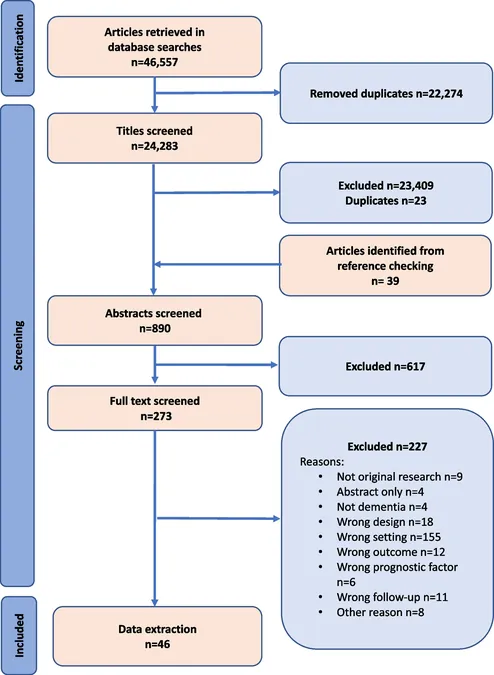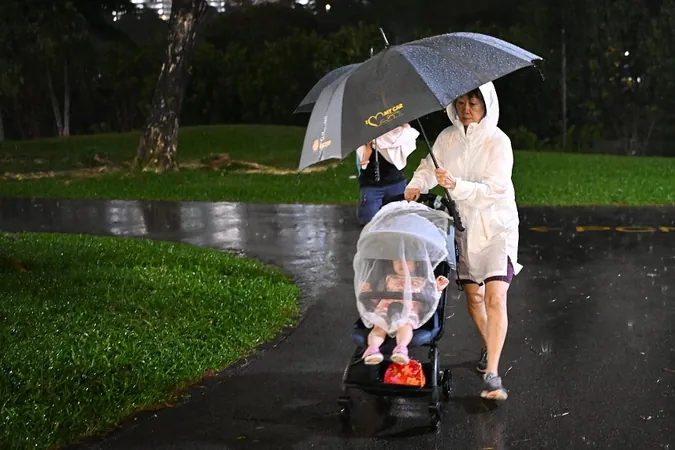
Unveiling Prognostic Factors for Dementia: Key Indicators From Primary Care Records That Could Change Lives!
2024-10-01
A groundbreaking systematic review has emerged, focusing on the critical prognostic factors that predict poor outcomes in individuals living with dementia. This extensive research highlights how data pulled from primary care medical records can reveal valuable insights for clinicians, caregivers, and policy makers alike.
The study meticulously followed PRISMA guidelines and was registered with PROSPERO before the research began. The review incorporated data from an impressive nine databases up until June 17, 2022, analyzing numerous studies on various types of dementia, such as Alzheimer's, vascular dementia, and Lewy body dementia.
What Did Researchers Discover?
The scope of the research was defined by strict inclusion criteria, examining longitudinal cohort studies and electronic health records. Importantly, the studies had to focus on individuals with diagnosed dementia who primarily resided in the community, ensuring that the findings would hold relevance for primary care settings.
Among the 46 studies analyzed, a variety of candidate prognostic factors were identified. These included sociodemographic factors such as age, sex, education level, and living situation, as well as clinical measures like comorbidities and overall function. Also of interest were lifestyle factors and contextual issues, such as caregiver support and the presence of a power of attorney.
The Heart of the Matter: Outcomes
The review concentrated on several key long-term outcomes, specifically:
1. Care Home Admission: The first recorded instances post-dementia diagnosis.
2. Cognitive Decline: Measured by validated tools like the Mini Mental State Examination (MMSE).
3. Need for Palliative Care: Including hospice admission post-diagnosis.
Key Findings on Risk Factors
From the comprehensive analysis, researchers unearthed several critical risk factors associated with care home admission and cognitive decline. Notable among these were:
- Care Home Admission:
- Older age
- Poor baseline cognition
- Living alone
- Neuropsychiatric symptoms like depression and psychosis
- Cognitive Decline:
- Longer duration of dementia
- Presence of agitation and aggression
The majority of the research highlighted that neuropsychiatric factors—such as psychosis and depression—emerged as exceptionally strong indicators of poorer outcomes.
Engagement with Patients and Stakeholders
An essential aspect of this study involved engaging with caregivers and stakeholders through Patient and Public Involvement and Engagement (PPIE) group meetings. Caregivers highlighted additional factors they believed might predict worse outcomes, leading to a richer understanding of the dementia landscape.
The Call to Action: Future Directions
This review is not just an academic exercise; it represents a clarion call for more focused research to investigate additional factors believed to contribute to poorer outcomes. Significant areas requiring further exploration include:
- Health Inequalities: Factors like socioeconomic status and geographical location may play critical roles in care accessibility.
- Caregiver Dynamics: The impact of caregiver burden and their perspectives on care decisions.
Strengths and Limitations
While the study successfully drew on a comprehensive array of factors evaluated in primary care settings, it also acknowledged limitations, particularly the variability in definitions and measurement tools used across studies, which hindered direct comparisons.
Conclusion: A Path Forward for Dementia Care
As we aim to improve care for individuals living with dementia, integrating these findings into clinical practice could revolutionize the way we assess risk and plan interventions. With a clearer picture of the factors that predict poor outcomes, healthcare professionals can better tailor their approaches, ultimately enhancing the quality of care for those affected by this devastating condition.
Stay Engaged: If you're involved in dementia care or research, this review might offer new insights to consider in your practice. Together, let's turn the tide on dementia!




 Brasil (PT)
Brasil (PT)
 Canada (EN)
Canada (EN)
 Chile (ES)
Chile (ES)
 España (ES)
España (ES)
 France (FR)
France (FR)
 Hong Kong (EN)
Hong Kong (EN)
 Italia (IT)
Italia (IT)
 日本 (JA)
日本 (JA)
 Magyarország (HU)
Magyarország (HU)
 Norge (NO)
Norge (NO)
 Polska (PL)
Polska (PL)
 Schweiz (DE)
Schweiz (DE)
 Singapore (EN)
Singapore (EN)
 Sverige (SV)
Sverige (SV)
 Suomi (FI)
Suomi (FI)
 Türkiye (TR)
Türkiye (TR)